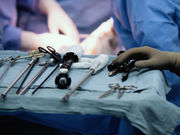Lower rates of awareness of prolapse, reoperation for prolapse; higher rates of de novo incontinence
WEDNESDAY, Feb. 10, 2016 (HealthDay News) — For women with vaginal prolapse, mesh repair is associated with mixed outcomes, according to a review published online Feb. 9 in The Cochrane Library.
Christopher Maher, M.D., Ph.D., from the Royal Brisbane Women’s Hospital in Australia, and colleagues examined the safety and effectiveness of transvaginal mesh or biological grafts compared to native tissue repair for vaginal prolapse. Data were included for 37 randomized controlled trials, involving 4,023 women.
The researchers found that in comparison of permanent mesh versus native tissue repair, prolapse awareness at one to three years was less likely after mesh repair (risk ratio [RR], 0.66). The mesh group had lower rates of repeat surgery for prolapse (RR, 0.53). There was no evidence of a between-group difference for repeat surgery for continence. The mesh group had higher rates of repeat surgery for the combined outcome of prolapse, stress incontinence, or mesh exposure (RR, 2.40). After mesh repair, recurrent prolapse on examination was less likely (RR, 0.40). Higher rates of de novo stress incontinence and bladder injury were seen in association with permanent mesh (RR, 1.39 and 3.92, respectively).
“The risk benefit profile means that transvaginal mesh has limited utility in primary surgery,” the authors write. “While it is possible that in women with higher risk of recurrence the benefits may outweigh the risks, there is currently no evidence to support this position.”
Copyright © 2016 HealthDay. All rights reserved.








